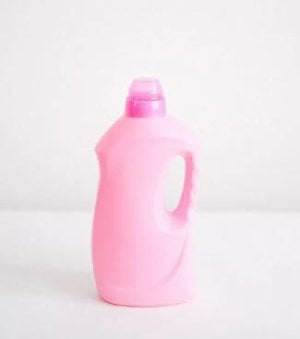Cleaner’s frightening experiment will make you never want to use fabric softener again
- Replies 19
Fabric softener has become a staple in doing our laundry. The product adds that extra 'oomph' by infusing a nice scent into the fabric while making it feel softer to the touch.
But while fabric softener is great for those reasons, one concerning experiment has us questioning its safety.
Laundry expert Zachary Pozniak took to social media to explain why fabric softeners are something you should reconsider using altogether.
In a video he posted on TikTok, he said that using the product makes clothes more flammable. In the clip, he used two pieces of microfibre cloth and washed one of them with fabric softener.
Next, he held a lit match underneath each cloth.
In the video, the left piece (without fabric softener) doesn’t burn as much and the fire goes out quickly. However, the right piece, which was washed with fabric softener, burned at an alarming rate.
‘Oh my God I should put this out before I burn my office down,’ Zachary said as he dunked the flaming cloth in water.
He explained the phenomena in the video: ‘[This is] because fabric softener contains molecules that increase the surface area, which makes it feel softer but also more flammable.’
To prove that this wasn’t a fluke, Zachary did the experiment more than once.
Many of his followers welcomed the new information and led others to share that some people used fabric softeners as a substitute for other cleaning materials around the house.
One wrote: ‘This is why I try to tell people not to put fabric softener and water in a spray bottle as “homemade Febreeze”.’
Someone else explained that people were using this on their floors and walls. While others pointed out that some clothing items have warning labels on them to avoid certain laundry products.
‘This is why PJs probably say “do not use fabric softener on them or you may decrease their flame resistance”’, one explained.
You can watch Zachary’s experiment below:
Australian consumer advocacy group, CHOICE, backed up Zachary’s claim.
‘As far as we're aware, all fabric softeners reduce the fire retardancy of clothing…they reduce moisture absorbency [as well]. Because they’re not detergents, fabric softeners don’t make your clothes cleaner,’ said Ashley Iredale from CHOICE.

Do you use fabric softener? If so, we would love to hear from you in the comments below! Also, remember to visit our forum for more cleaning tips and tricks.
But while fabric softener is great for those reasons, one concerning experiment has us questioning its safety.
Laundry expert Zachary Pozniak took to social media to explain why fabric softeners are something you should reconsider using altogether.
In a video he posted on TikTok, he said that using the product makes clothes more flammable. In the clip, he used two pieces of microfibre cloth and washed one of them with fabric softener.
Next, he held a lit match underneath each cloth.
In the video, the left piece (without fabric softener) doesn’t burn as much and the fire goes out quickly. However, the right piece, which was washed with fabric softener, burned at an alarming rate.
‘Oh my God I should put this out before I burn my office down,’ Zachary said as he dunked the flaming cloth in water.
He explained the phenomena in the video: ‘[This is] because fabric softener contains molecules that increase the surface area, which makes it feel softer but also more flammable.’
To prove that this wasn’t a fluke, Zachary did the experiment more than once.
Many of his followers welcomed the new information and led others to share that some people used fabric softeners as a substitute for other cleaning materials around the house.
One wrote: ‘This is why I try to tell people not to put fabric softener and water in a spray bottle as “homemade Febreeze”.’
Someone else explained that people were using this on their floors and walls. While others pointed out that some clothing items have warning labels on them to avoid certain laundry products.
‘This is why PJs probably say “do not use fabric softener on them or you may decrease their flame resistance”’, one explained.
You can watch Zachary’s experiment below:
Australian consumer advocacy group, CHOICE, backed up Zachary’s claim.
‘As far as we're aware, all fabric softeners reduce the fire retardancy of clothing…they reduce moisture absorbency [as well]. Because they’re not detergents, fabric softeners don’t make your clothes cleaner,’ said Ashley Iredale from CHOICE.
Key Takeaways
- Fabric softener makes clothes more flammable.
- It can also damage delicate materials and reduce the fire resistance of clothing.
- Because they’re not detergents, fabric softeners don’t make your clothes cleaner.









